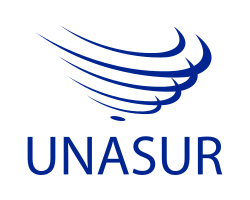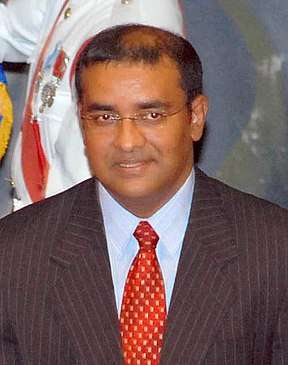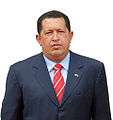2010 South American Summit
The 2010 South American summit (officially the 4th Ordinary Meeting of the Council of Heads of State and Government of the Union of South American Nations), took place in Georgetown, Guyana on November 26, 2010. Eight heads of state and four foreign ministers of the Union of South American Nations attended the summit. During the summit, the leaders signed an additional protocol to the Constitutive Treaty, adding a democratic clause to the charter of the organization.[1] The Georgetown summit ended with the Ecuadorian president handing the UNASUR pro-tempore presidency for the next twelve months to his Guyanese counterpart, Bharrat Jagdeo.[2]
| 2010 South American Summit | |
|---|---|
 | |
| Host country | Guyana |
| Date | November 26, 2010 |
Leaders at the summit
Heads of State and Government
The heads of state and heads of government of eight countries participated.[3] The heads of state from Chile, Peru, Uruguay and Bolivia could not attend.[4]
Foreign ministers
The foreign ministers of Bolivia (David Choquehuanca), Chile (Alfredo Moreno), Peru (José Antonio García Belaúnde) and Uruguay (Luis Almagro) represented their respective governments.[2]
Issues
Regional integration
Brazilian President Luiz Inácio Lula da Silva advocated for the elimination of the asymmetries stopping the integration of South America, in his speech during the summit. "None of our countries will really be prosperous, without all of us being also prosperous," said the Brazilian president.[5]
Secretary-General
The name of the new secretary-general of the organization will remain unknown until the next presidential meeting in Mar del Plata, Argentina.[6]
Guyanese presidency
Guyana, which took over the Unasur rotating presidency from Ecuador, is one of South America's poorest countries and for this reason, President Lula has already announced that Brazil will provide assistance for Georgetown's efforts in presiding over the regional bloc.[1]
Falklands/Malvinas
The summit addressed the Falkland Islands sovereignty dispute between Argentina and the United Kingdom. Several articles of the final declaration state that all Unasur ports will be closed to vessels operating under the "illegal flag of Malvinas (Falkland Islands)".[7]
Accomplishments
Democratic clause
The leaders adopted an additional protocol to the organization's Constitutive Treaty, which added a democratic clause to the charter.[8] The democratic clause imposes sanctions on any member country of UNASUR that breaks or attempts to break constitutional rule or the democratic system.[7] The clause establishes sanctions, such as shutting down borders and the suspension of trade, against the country that suffers an attempted coup. The decision to include a democratic clause was made after the recent upheaval in Ecuador that briefly threatened the administration of President, Rafael Correa.[9]
Georgetown Declaration
At the end of the summit, the heads of state and foreign ministers issued the "Georgetown Declaration". In the declaration, the leaders reiterated their commitment expressed in the “Declaration of Bariloche” of August 28, 2009, to strengthen South America as a zone of peace, upholding the decision to refrain from resorting to the threat or use of force against the territorial integrity of another UNASUR State.[10] The leaders expressed their willingness to continue working toward the consolidation of a common space for the political, economic, social, cultural, energy, environmental and infrastructure integration of the region, in order to achieve sustainable development.[11]
References
- LatAm leaders seek mechanisms to avoid coups Archived 2011-07-26 at the Wayback Machine Fox News. Retrieved on 2010-11-27.
- Guyana takes office as Unasur president Xinhua. Retrieved on 2010-11-27.
- Incumbent UNASUR Chairman optimistic of a better South America Archived 2011-07-16 at the Wayback Machine Guyana: Government Information Agency. Retrieved on 2010-11-27.
- ‘Kirchner will always be a source of inspiration to the region,’ Lula says at Unasur Summit Buenos Aires Herald. Retrieved on 2010-11-27.
- Brazilian President Advocates for Regional Unity Inside Costa Rica. Retrieved on 2010-11-27.
- UNASUR Begins New Integrating Stage Archived 2010-12-01 at the Wayback Machine Escambray. Retrieved on 2010-11-27.
- Unasur unable to agree on secretary; closes all ports to ‘illegal’ Malvinas flagged vessels Mercopress. Retrieved on 2010-11-27.
- Additional Protocol to the Constitutive Treaty of the Union of South American Nations on Commitment to Democracy Archived 2011-07-16 at the Wayback Machine Guyana: Government Information Agency. Retrieved on 2010-11-27.
- UNASUR Summit condemned attempt of coup d´etat in Ecuador and reasserted commitment to democratic institutions Archived 2010-10-02 at WebCite Telam. Retrieved on 2010-11-27.
- South American Heads pledge ‘unwavering respect for human rights’ Stabroek News. Retrieved on 2010-11-27.
- UNASUR Summit close with historic ‘Georgetown Declaration’ Kaieteur News. Retrieved on 2010-11-27.
.jpg)



.jpg)
